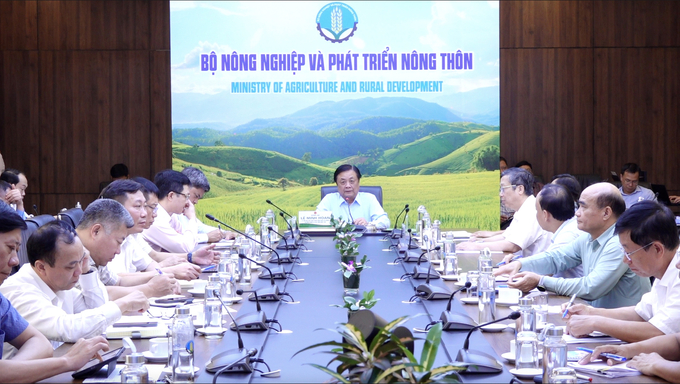May 29, 2025 | 18:20 GMT +7
May 29, 2025 | 18:20 GMT +7
Hotline: 0913.378.918
May 29, 2025 | 18:20 GMT +7
Hotline: 0913.378.918

Leaders from several departments, divisions, and entities within the Ministry of Agriculture and Rural Development (MARD) met under the leadership of Minister Le Minh Hoan. Photo: Thanh Thuy.
Director of the Planning Department Nguyen Van Viet reported at a meeting on October 9, which was convened by Minister Le Minh Hoan, that the first nine months of 2024 exhibited stable growth in spite of a variety of challenges, including Typhoon No. 3. The sector's overall growth rate was 3.2%, which, despite being the lowest since 2021, was still an important achievement across all fields.
In agriculture, rice output experienced a modest increase in both productivity and area, exceeding 34 million tons, which represents a 1.5% increase from the previous year. Additionally, there was considerable expansion in fruit trees, while certain crops, including soybeans and corn, experienced declines. Cashew experienced a minor decline, while rubber, coffee, and tea all demonstrated upward trends.
Additionally, the livestock sector demonstrated favorable developments, as poultry production increased by 3.4% and milk production increased by 5.6%. Nevertheless, the total pig population experienced a minor decrease as a result of disease, particularly African swine fever. Aquaculture output increased by 3.7%, while capture output increased by 0.7%, resulting in an annual estimate of 9.12 million tons in the fisheries sector.

The industry is focusing on key tasks for the last quarter of 2024, including restoring production after the storm and developing an investment plan for the 2026-2030 period. Photo: VGP.
There was a 12% decrease in the area of damaged forest, and the forestry sector experienced a growth rate of 4.96%. Timber exploitation experienced a 7% increase, resulting in a contribution of nearly 2,300 billion VND to forest environmental services.
Products such as seafood, fruits, and coffee experienced substantial growth, resulting in a 21% increase in agricultural exports to USD 46.28 billion. There is an expectation that annual exports will surpass USD 60 billion, and the trade surplus will reach USD 13.86 billion.
The sector is currently concentrating on critical tasks for the final quarter of 2024, such as the recovery of production following the typhoon and the development of investment strategies for the years 2026-2030. Additionally, the Planning Department identified substantial obstacles in 2024, such as the obstruction of fundamental infrastructure investment and Typhoon No. 3. While MARD has made strides in the distribution of public investment, it must resolve legal concerns to guarantee that infrastructure projects proceed according to plan.
Minister Le Minh Hoan underscored the significance of comprehending and interpreting both positive and negative indicators to facilitate the agricultural sector's transition from agricultural production to an agricultural economic approach.
He advocated for the establishment of conferences and plans to develop specialized high-quality, low-emission rice cultivation for 1 million hectares, sustainable agriculture recovery, and development in fields such as agricultural production, animal husbandry, and fisheries in anticipation of forthcoming challenges. The Mekong Delta is also the subject of plans for the resolution of issues such as land subsidence, erosion, saltwater intrusion, and pure water solutions.

"In the aftermath of Typhoon No. 3, it is imperative that we all consider the agricultural sector. To withstand the impact of natural disasters, it is necessary to develop innovative solutions, such as early action", said Minister Le Minh Hoan. Photo: Thanh Thuy.
The Minister emphasized the necessity of agricultural insurance and designated the appropriate departments to conduct research and submit a report on the subject. He emphasized the significance of standardized production processes to define losses resulting from natural disasters, diseases, or non-compliance by producers. This would facilitate the implementation of precise and accurate insurance solutions.
Furthermore, MARD intends to establish a task force to resolve the EU Ambassador's concerns, particularly concerning the Plant Protection and Animal Health Departments. The task force will underscore the necessity of thoroughly examining compliance with EU regulations.
Minister Hoan raised concerns regarding potential solutions to assist farmers in resuming production after Typhoon No. 3. He assigned various departments to both short-term recovery efforts and long-term sustainability planning.
Furthermore, it is essential to take into account the income of producers and the infrastructure criteria, particularly in mountainous regions.
"In the aftermath of Typhoon No. 3, it is imperative that we all consider the agricultural sector. To withstand the impact of natural disasters, it is necessary to develop innovative solutions, such as early action, resilience enhancement, remote sensing infrastructure, telecommunications, forecasting, warning, monitoring systems, risk segmentation, and community training", Minister Le Minh Hoan proposed.
He also underscored the significance of a community perspective, utilizing practical solutions derived from grassroots dynamism and local knowledge.
Translated by Linh Linh

(VAN) Ms. Nguyen Thi Dung, Deputy Director of Ngoc Hoang Cooperative, shared about the journey of bringing dragon fruit to Europe, achieving annual revenues in the billions of VND.

(VAN) Bamboo products from Thang Tho Bamboo Cooperative have reached many countries around the world, while also creating jobs for local workers.

(VAN) The Management Board of Con Dao National Park reported that a green sea turtle, tagged in the Philippines, has traveled thousands of kilometers to lay 84 eggs on Bay Canh Islet.

(VAN) Green technology is paving a new path for sustainable aquaculture in the Mekong Delta in particular and across the country in general, helping reduce emissions and adapt to climate change.

(VAN) On May 27, La French Tech Vietnam (the French startup and innovation community in Vietnam) held the French Tech Summit Vietnam 2025.
/2025/05/27/4731-2-223159_980.jpg)
(VAN) No votive paper, no styrofoam, no plastic bags, no plastic bottles, and no single-use plastic trays are the key rules tourists should keep in mind when visiting Con Dao.

(VAN) In the fight against plastic pollution, Vietnam has been demonstrating a proactive, pioneering, and active role in addressing the greatest environmental challenge today.